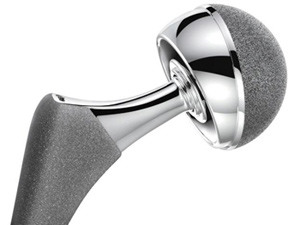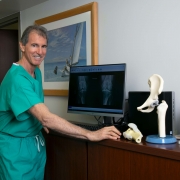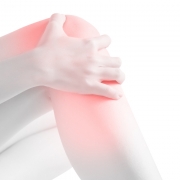Metal-on-Metal Hip Replacements
Recently the FDA released a statement of concern about hip replacements performed with a metal-on-metal bearing. The metals used in these prostheses include chromium and cobalt. There had been a recent surge in usage by many orthopedic surgeons because preliminary information suggested that metal-on-metal was more durable and therefore potentially more long-lasting then other bearing surfaces. Unfortunately, this is proving not to be the case.
In the past I have used metal-on-metal bearings only in select patients on whom I performed hip resurfacing, as this was the only bearing available for that procedure. However, I have all but stopped doing hip resurfacing because of my concerns with metal-on-metal as well as other problems associated with this procedure. I don’t think the potential benefits of using a metal-on-metal articulation outweigh the known and significant risks.
I have avoided metal-on-metal hip replacements because it may increase the potential risk of soft tissue destruction around the hip and throughout the body. In my opinion, the potential for a longer lasting hip — which has not been proven — is not justification for the possible damage and long-term consequences of having increased levels of cobalt and chromium released in the body.
Problems associated with use of metal-on-metal hip replacements include tissue and bone damage and in some cases infection. All artificial joints shed tiny pieces of debris and researchers believe that particles released by all-metal hips cause the body’s protective tracking cells to convert the debris into metallic ions, which ultimately can cause a chain reaction and destroy tissue and muscle. The metal ions potentially can trigger a hypersensitivity reaction and cause problems associated with the kidneys and worse.
Some 500,000 people in the U.S. have received all-metal hips over the past decade. Now there are reports that patients with metal-on-metal artificial hips intended to last 15 years or more are experiencing early prosthesis failure in as little as two years. Studies also predict that these numbers will rise.
According to the New York Times, the FDA received more than 5,000 reports about all-metal hip problems during the first six months of 2011.
I prefer to use a metal or ceramic femoral head against highly crossed-linked polyethylene. Highly crossed-linked polyethylene has become the gold standard for implants as evidenced by the fact that all the major implant companies now produce it and tout its benefits. The wear characteristics are much, much better than conventional or non-highly crossed-linked polyethylene. Plastic wear debris still is produced, but the amount is much smaller and the consequences of this debris are much better understood.
We encourage anyone who has had an all-metal hip replacement to have a check-up as sometimes tissue destruction occurs although the patient has no obvious symptoms such as pain.
At the Leone Center we are prepared to treat people suffering from problems associated with all-metal hip replacements and provide solutions with safer, more durable outcomes.












